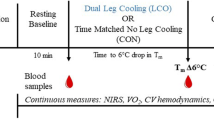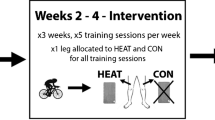Summary
The effect of low muscle temperature on the response to dynamic exercise was studied in six healthy men who performed 42 min of exercise on a cycle ergometer at an intensity of 70% of their maximal O2 uptake. Experiments were performed under control conditions, i.e. from rest at room temperature, and following 45 min standing with legs immersed in a water bath at 12°C. The water bath reduced quadriceps muscle temperature (at 3 cm depth) from 36.4 (SD 0.5)°C to 30.5 (SD 1.7)°C. Following cooling, exercise heart rate was initially lower, the mean difference ranged from 13 (SD 4) beats · min−1 after 6 min of exercise, to 4 (SD 2) beats · min−1 after 24 min of exercise. Steady-state oxygen uptake was consistently higher (0.21 · min−1). However, no difference could be discerned in the kinetics of oxygen uptake at the onset of exercise. During exercise after cooling a significantly higher peak value was found for the blood lactate concentration compared to that under control conditions. The peak values were both reached after approximately 9 min of exercise. After 42 min of exercise the blood lactate concentrations did not differ significantly, indicating a faster rate of removal during exercise after cooling. We interpreted these observations as reflecting a relatively higher level of muscle hypoxia at the onset of exercise as a consequence of a cold-induced vasoconstriction. The elevated steady-state oxygen uptake may in part have been accounted for by the energetic costs of removal of the extra lactate released into the blood consequent upon initial tissue hypoxia.
Similar content being viewed by others
References
Asmussen E, Boje O (1945) Body temperature and capacity for work. Acta Physiol Scand 10:1–22
Bergh U, Ekblom B (1979) Physical performance and peak aerobic power at different body temperatures. J Appl Physiol 46:885–889
Bergmeyer HU (1974) Methoden der enzymatischen Analyse. Verlag Chemie, Weinheim, p 1521
Blomstrand E, Bergh U, Essén-Gustavsson B, Ekblom B (1984) Influence of low muscle temperature on muscle metabolism during intense dynamic exercise. Acta Physiol Scand 120:229–236
Edwards RHT, Harris RC, Hultman E, Kaijser L, Koh D, Nordesjö L-O (1972) Effect of temperature on muscle energy metabolism and endurance during successive isometric contractions, sustained to fatigue, of the quadriceps muscle in man. J Physiol 220:335–352
Giesbrecht GG, Bristow GK, Uin A, Ready AE, Jones RA (1987) Effectiveness of three field treatments for induced mild (33.0°C) hypothermia. J Appl Physiol 63:2375–2379
Holmér I, Bergh U (1974) Metabolic and thermal responses to swimming in water at varying temperatures. J Appl Physiol 37:702–705
Ishii M, Ferretti G, Cerretelli P (1989) Effects of muscle temperature on \(\dot VO_2\)on-kinetics at the onset of exercise in man. Proceedings of the International Union of Physiological Sciences, Helsinki, Finland, P3400
Jose AD, Stitt F, Collison D (1970) The effects of exercise and changes in body temperature on the intrinsic heart rate in man. Am Heart J 79:488–498
Nadel ER, Holmér I, Bergh U, Åstrand P-O, Stolwijk JAJ (1974) Energy exchanges of swimming man. J Appl Physiol 36:465–471
Rome LC, Loughna PT, Goldspink G (1984) Muscle fiber activity in carp as a function of swimming speed and muscle temperature. Am J Physiol 247:R272-R279
Sargeant AJ (1987) Effect of muscle temperature on leg extension force and short-term power output in humans. Eur J Appl Physiol 56:693–698
Veicsteinas A, Ferretti G, Rennie DW (1982) Superficial shell insulation in resting and exercising man in cold water. J Appl Physiol 52:1557–1564
Author information
Authors and Affiliations
Rights and permissions
About this article
Cite this article
Beelen, A., Sargeant, A.J. Effect of lowered muscle temperature on the physiological response to exercise in men. Eur J Appl Physiol 63, 387–392 (1991). https://doi.org/10.1007/BF00364467
Accepted:
Issue Date:
DOI: https://doi.org/10.1007/BF00364467




